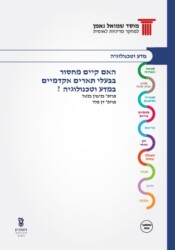מחקר זה הוא המשך לעבודה שנעשה בשנת 2014 תחת הכותרת “מקום אוניברסיטאות המחקר במערך המו”פ הלאומי בישראל” והוא מתמקד בכוח אדם אקדמי בתחומי המדע והטכנולוגיה ובוחן את השאלה האם מסתמן מחסור בבעלי תארים אקדמיים במדע וטכנולוגיה בישראל.
המסקנה מעבודה זו היא, בניגוד לדעה הרווחת בציבור ובתעשייה, שאין מחסור גורף במקבלי תארים אקדמיים בתחומי המו”ט.
מסקנה זו נשענת על שני טעונים: הראשון מבוסס על בחינה כמותית של מספר מקבלי תארים במו”ט לעומת העוסקים במשלחי יד מדעיים. מערכת ההשכלה הגבוהה (אוניברסיטאות ומכללות) מעניקה בשנה למעלה מ-10,000 תארי בוגר בתחומי המו”ט, (לא כולל רפואה ורוקחות), ועוד כ-4,000 תארים מתקדמים (מסטר ודוקטורט) בתחומים אלה. מבדיקת סקרי כח אדם של הלמ”ס מתברר שמספרים אלה שקולים לכ-10% מסך המועסקים במשלחי יד אקדמיים במו”ט בכל ענפי המשק. שעור זה מספיק לפצות על פרישה טבעית, כולל פרישתם הצפויה של בעלי תארים במו”ט מבריה”מ לשעבר. הטעון השני מושתת על התפתחות השכר הריאלי במשלחי יד בתחומי המו”ט על פני כ-15 שנים. בדיקה שנעשתה בחברות כ”א ובסקרי שכר מגלה שאין מגמת עליה בשכר זה, עליה שהיתה מצביעה על מחסור בבעלי תארים אקדמיים בתחומים הנבדקים.
עם זאת, ממצאים מצרפיים אלה אינם שוללים קיום מחסור בתחומים ספציפיים. ואמנם, קיימות אינדיקציות להיווצרות מחסור בתחומים יחודיים של הנדסת חומרה ופתוח תוכנה. חוסרים נקודתיים כאלה הם בלתי נמנעים בעולם של טכנולוגיות משתנות המתחלפות בתדירות גבוהה.


